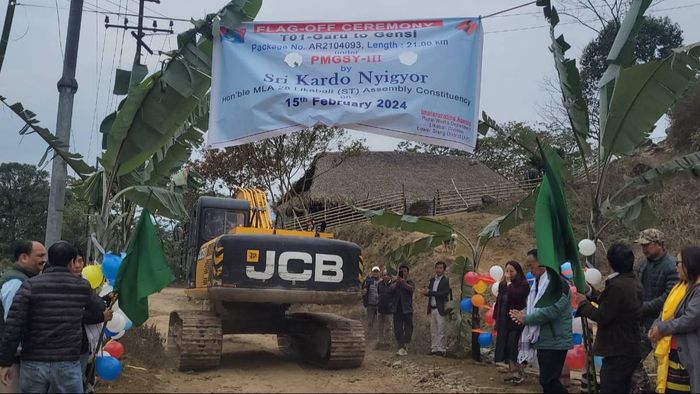Election stunt or long-awaited relief? Arunachal MLA flags off controversial road project
The 21-kilometer stretch of the Garu to Gensi road, a part of the Pradhan Mantri Gram Sadak Yojana (PMGSY), was inaugurated by Kardo Nyigyor, the MLA representing the 28th Likhabali Assembly constituency.

- Feb 15, 2024,
- Updated Feb 15, 2024, 5:41 PM IST
As the Assembly Elections draw near in Arunachal Pradesh, the political landscape is buzzing with activity, with promises and projects being rolled out. Among these, the recent flagging off of the Garu to Gensi road project in the Lower Siang district under the 28th Likhabali constituency has sparked both hope and skepticism among the locals.
The 21-kilometer stretch of the Garu to Gensi road, a part of the Pradhan Mantri Gram Sadak Yojana (PMGSY), was inaugurated by Kardo Nyigyor, the MLA representing the 28th Likhabali Assembly constituency. The event saw the presence of officials from the Rural Work Department (RWD), contractors, public leaders, and enthusiastic youths from the area.
Despite being in proximity to the district headquarters of Likhabali and the national highway NH15 in Assam, the Gensi circle has been grappling with inadequate road infrastructure, leaving its ten remote villages isolated from better connectivity.
Addressing concerns about the timing of the project amidst the approaching elections, MLA Kardo Nyigyor denied any political motive behind the initiative, asserting that the project had been sanctioned under the PMGSY III scheme. He elaborated, stating that the lengthy documentation process for tender and approval had consumed six months, leading to the eventual commencement of the project, slated for completion within two years.
"This road has been a longstanding demand of the locals," Nyigyor emphasized. "Its inception dates back to 1964, plagued by challenges such as poor alignment and susceptibility to seasonal damage due to heavy rains."
The MLA further explained his efforts to secure funding for the project, citing unsuccessful attempts to obtain approval under various schemes before finally securing it under PMGSY. He highlighted his track record of initiating development projects in his constituency, including roads, school infrastructures, and medical institutions.
While the project's commencement brings a glimmer of hope for improved connectivity and socio-economic development in the region, skepticism looms over its timing and execution, with critics questioning its potential exploitation as an election stunt.